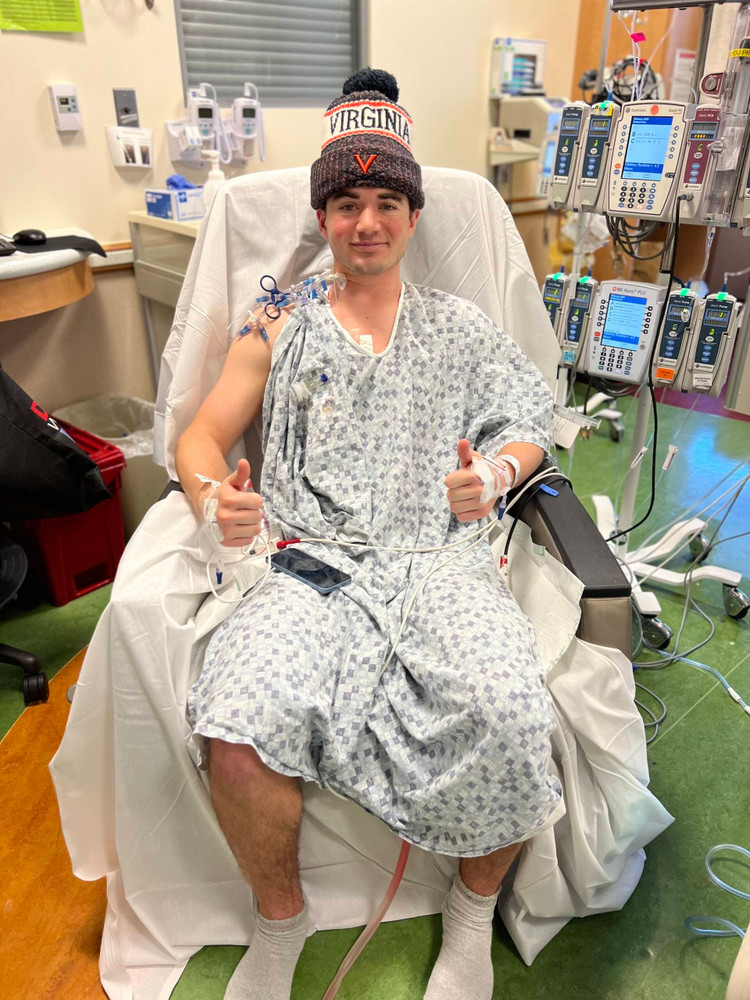“For an emergency, you can call whenever,” Vozzo said.
And so, when she saw an incoming call from goalie Matthew Nunes at 10:20 one night last fall, Vozzo braced herself. When she picked up, Nunes handed his phone to Tucker Mullen. Earlier that evening, Mullen had informed several of his teammates, including Nunes, that he’d been having chest pains for several days. They went online and plugged in his symptoms to Doctor Google, a medical search engine. What they saw alarmed them.
“We were like, ‘Do we need to go to the hospital right now? Is Tucker gonna die right here?’” Nunes recalled. “After researching the internet, we were like, ‘OK, this is something that could be bigger than just a little bruise on the chest.’”
Unsure how they should proceed, Nunes ignored Mullen’s objections and called Vozzo. “Tucker didn’t want me to know because he wanted to practice,” Vozzo said, “but by the next day he was in so much discomfort, he would not have been able to.”
Thus began a medical odyssey for Mullen that included open-heart surgery in late November 2023. The fourth-year attackman has had setbacks in his recovery, including three bouts with pericarditis—inflammation of the lining around the heart—but Mullen was able to participate in most of Virginia’s workouts this fall and expects to play in the spring.
“It’s startling,” UVA head coach Lars Tiffany said of seeing Mullen back on the field. “(After he had surgery), playing again wasn’t really one of the first things we thought about. It was, ‘Let’s just get this man healthy so he can stay alive.’ Honestly, when you hear ‘open-heart surgery,’ the assumption is he’s never playing again.”
When freshman Ryan Duenkel asked him this fall how it felt to be playing again, Mullen said, “I was like, ‘Dude, it was the most fun I’ve ever had playing the sport,’ because it’s been so long since I got to do it, and there was part of me that didn’t know if I was ever going be able to do it. That was definitely part of the equation. I never knew how I was going to respond to the surgery.”
Mullen grew up in Delray Beach, Florida, about 30 miles north of Fort Lauderdale. He graduated from The Taft School in Connecticut in the spring of 2021 and enrolled at UVA that summer. He went through fall practice with the team, and everything was “pretty smooth sailing until February (2022),” Mullen said.
Teammates and coaches laud Mullen’s positive outlook despite facing many hurdles in his UVA career. (UVA Athletics photo)
After playing in two games that month—he scored his first goal as a Cavalier against the Air Force Academy—Mullen took a blow to the shoulder and tore his labrum. He didn’t play again that season and, after rehabbing didn’t ease his shoulder pain, underwent surgery that summer. Mullen missed fall practice in 2022 but was cleared to play in 2023.
He appeared in six games for the Wahoos that spring and scored one goal, and he entered his third year in high spirits. “Everything was good for about two months,” Mullen recalled. “I was healthy and made it into October, and then bang!”

During a practice last fall, Mullen noticed some pressure in his chest. “It wasn’t like a pain,” he said. “It was more kind of like a light hand pushing, and I didn’t think anything of it. I made it through, like, two days of practice, and then I was like, ‘OK, this feels a little wonky. Something’s not totally right.’ I was really reluctant to say anything, because I had typical athlete mindset of, ‘We’ll get through it.’”
Once he told his teammates, however, the Cavaliers’ medical staff got involved, and the search for the cause of Mullen’s problems began. It didn’t go well initially.
“There was about two months of just constant tests, blood tests,” Mullen said. “They probably did like 10 of those. EKGs over and over again, different kinds of screening. We did a lot of heart (echocardiograms). And everyone was like, ‘We have no idea what’s wrong.’ They couldn’t figure out anything.”
Mullen’s sister, Taylor, who played for the UVA women’s lacrosse team as a graduate transfer in 2023, had interned for Dr. Charles Berul, a cardiologist at Children’s National Hospital in Washington. The siblings’ mother, Lisa Mullen, contacted Berul, “and he was like, ‘All right, bring him in, and let’s see what we can figure out,’” Tucker Mullen said.
There’s no history of heart disease in the family, Mullen said, and Berul found nothing out of the ordinary. Another doctor came to the same conclusion after examining Mullen. Finally, though, an MRI revealed Mullen had anomalous origin of the right coronary artery, a rare birth defect that occurs when the right coronary artery doesn’t originate in the anatomically correct place.
“So, I was getting like 30% blood flow out of one of my arteries,” said Mullen, whose UVA cardiologist is Dr. Peter Dean.
Mullen learned from his doctors that, if he didn’t have surgery, the defect might prove fatal, even if he gave up lacrosse.
“So, it was kind of a no-brainer for me,” Mullen said. “Even if I’m not playing Division I lacrosse the rest of my life, l don’t have to be worried about playing tennis when I’m older or something like that, and this being a problem. So it was a pretty easy answer for me. It was like, ‘Let’s do this, let’s fix it. I want keep trying to play and see what I can do.’”


